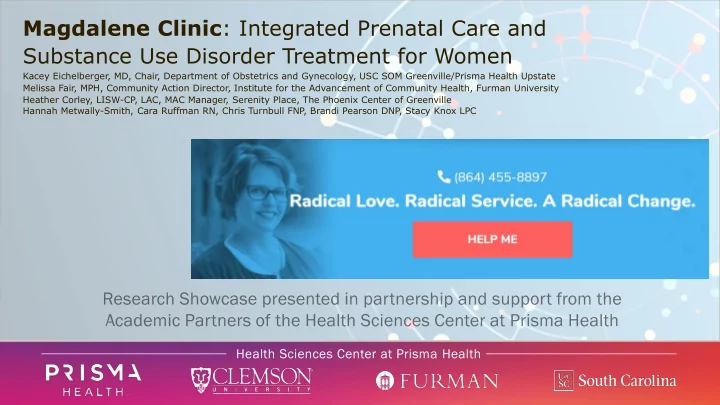

Magdalene Clinic : Integrated Prenatal Care and Substance Use Disorder Treatment for Women Kacey Eichelberger, MD, Chair, Department of Obstetrics and Gynecology, USC SOM Greenville/Prisma Health Upstate Melissa Fair, MPH, Community Action Director, Institute for the Advancement of Community Health, Furman University Heather Corley, LISW-CP , LAC, MAC Manager, Serenity Place, The Phoenix Center of Greenville Hannah Metwally-Smith, Cara Ruffman RN, Chris Turnbull FNP , Brandi Pearson DNP , Stacy Knox LPC Health Sciences Center at Prisma Health
Our collaborative model is based on 3 major premises: The Magdalene Clinic is a deeply 1) During pregnancy, women with SUDs are more likely to engage in prenatal affirming, collaborative-care model for care than addiction treatment. pregnant women with substance use 2) The prenatal care clinic is one of the best places to provide prenatal care and disorders (SUD), either active or in SUD treatment by providing a continuum of services at one site from remission. trained providers. 3) Through collaboration, we are leveraging existing community resources and expertise, thus creating a sustainable clinic model that better serves our patients’ need. Health Sciences Center at Prisma Health
Problem Statement and Significance According to a 2012 national survey, 5.9% of pregnant women • use illicit drugs, 8.5% drink alcohol, and 15.9% smoke cigarettes, resulting in an estimated 380,000 newborns exposed to illicit substances, 550,000 exposed to alcohol, and 1 million exposed to tobacco. The social controversy surrounding how pregnant women with • SUD are viewed in the US — as criminals rather than women suffering from a treatable mental illness — has created a barrier to accessing prenatal services. Women who use opioids and/or illicit substances during • pregnancy have higher mean hospitalization costs and poorer maternal and fetal birth outcomes. Few evidence-based models exist that combine prenatal care with • SUD treatment and complimentary behavioral health services. Health Sciences Center at Prisma Health
Radical Love. Radical Change. Radical Transparency. Goal: Provide a safe, non-judgmental, loving space for women who are using or have used illicit drugs to seek prenatal care. Design : At each visit, our patients see a collaborative team of providers championing their health: MDs/NPs, nurses, social workers, and a behavioral health team (licensed professional counselor and peer support specialist). What makes us unique : We use a collective impact approach, leveraging the capacities and strengths of partner organizations, rather than creating a program that is solely owned by the health system. Some of the things we are measuring: "They saved my life. Serenity helped me with the 1. Birth outcomes: gestational age at birth, birth weight, maternal and fetal changes I needed. The Magdalene Clinic provided complications, infant dependency, etc. resources that I needed. All the nurses were kind and 2. Maternal outcomes: impact on recovery status/intent, change in SDOH caring. They all checked on me constantly. They tried burden, change in behavioral health outcomes (depression, anxiety, etc.). to assist me with the addiction by providing a safe space. No complaints, they worked hard to save my 3. Change in maternal perceptions of provider, family, and self-stigma life. You guys are awesome. I'm really, really thankful around their condition. for everyone there.“ – Magdalene Patient Health Sciences Center at Prisma Health
Preliminary Evaluation Results Maternal Adverse Childhood Experiences Number of Patients Seen (ACE) Scores Year One (June 2018-July 2019) 85 Year Two (June 2019-Present) 99 40% Total Patients Seen 184 4 or more ACE 16% Maternal SDOHs and Health Factors Magdalene Clinic Receiving Medicaid 1 82% South Carolina Incarcerated in the past 12 months 1 76% 28% Currently unemployed 1 72% 2 or more ACE 22% Less than high school education 1 23% Reported smoking during pregnancy 2 72% Known mental health comorbidity(ies) 2 62% Positive drug screen during pregnancy 2 53% 18% 1 ACE Positive depression screening 3 51% 62% Positive food insecurity security screening 4 60% PRAPARE SDOH Screener 1 , EHR chart reviews 2 , Edinburg Postnatal Depression Screener 3 , Universal Food Insecurity Screener (2-item) 4 0% 20% 40% 60% 80% Health Sciences Center at Prisma Health
Who have we served? MJ/EtOH 8.1% Stim/OUD OUD 23.6% 45.3% Stim UD 23% Health Sciences Center at Prisma Health
Who have we served? Selected Outcomes for women with primary OUD MJ/THC PP visit 54.8% 8.1% Contraception at 75.3% discharge Stim/OUD OUD PTB < 37 23.3% 23.6% 45.3% PTB < 28 4.1% NAS diagnosis 53.4% Stim UD 23% Phoenix Center care 54.8% # of Mag visits 5.9 Health Sciences Center at Prisma Health
Who have we served? Selected Outcomes for women with primary Stim UD MJ/THC PP visit 43.2% 8.1% Contraception at 67.6% discharge Stim/OUD OUD PTB < 37 27% 23.6% 45.3% PTB < 28 2.7% NAS diagnosis NA Stim UD 23% Phoenix Center care 43.2% # of Mag visits 6 Health Sciences Center at Prisma Health
Who have we served? Selected Outcomes for women with combined Stim/OUD MJ/THC PP visit 50% 8.1% Contraception at 68.4% discharge Stim/OUD OUD PTB < 37 18.4% 23.6% 45.3% PTB < 28 2.6% NAS diagnosis 52.6% Stim UD 23% Phoenix Center care 42.1% # of Mag visits 5.4 Health Sciences Center at Prisma Health
Who have we served? Selected Outcomes for women with primary Marijuana +/-Alcohol UD PP visit 76.9% MJ/EtOH 8.1% Contraception at 84.6% discharge Stim/OUD PTB < 37 30.8% OUD 23.6% 45.3% PTB < 28 None NAS diagnosis NA Stim UD Phoenix Center care 76.9% 23% # of Mag visits 6 Health Sciences Center at Prisma Health
Future Directions 1. HHS RCORPs grant through Clemson for Oconee The Magdalene Clinic is an expansion - $500K for 3 years with Dr Phil Thomas innovative and replicable model with implications to improve 2. Other expansion partnerships? maternal and fetal birth outcomes 3. Medical-legal partnership for women with SUD while also expansion reducing health care expenditures. 4. Explore contingency management care Health Sciences Center at Prisma Health
Recommend
More recommend